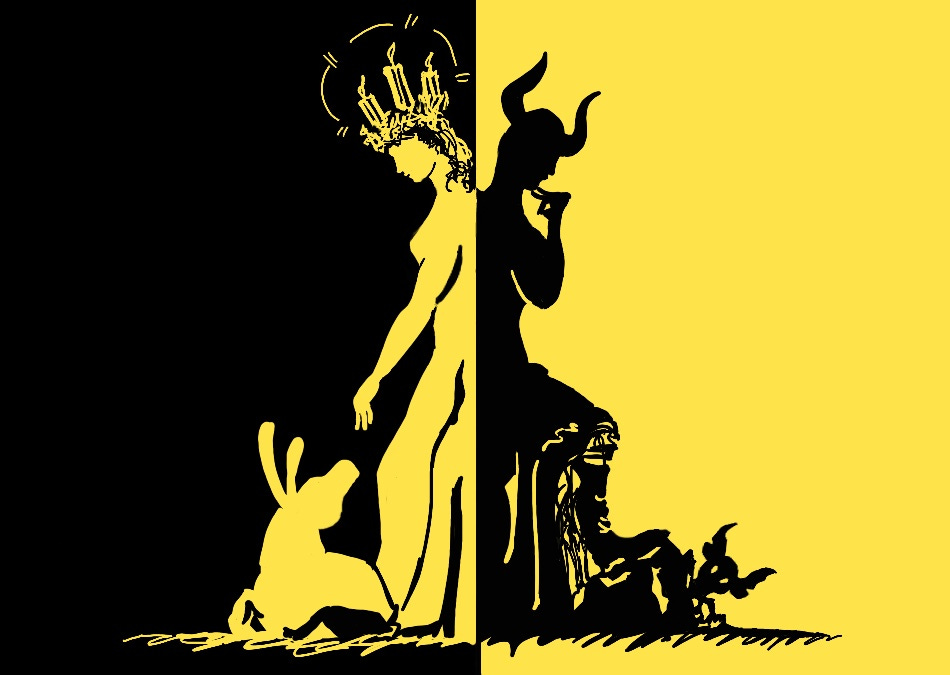The Longest Night
A tale of opposites
The longest night of the year belongs to both the light and the darkness.
At night, our brain sorts through the pieces, rearranging fragments of reality in new configurations that might reveal hidden truths, or muddle existing ones that are too heavy to bear. We search for clarity, for the reassuring essence of a yes, or a no.
That essence guided Lucia of Syracuse, the noble girl wearing a crown of candles, down to the catacombs where her Christian brothers and sisters were hiding. In the Italian peninsula of the 3rd century, being a Christian was punishable by death. Lucia brought them food, and went as far as disposing of the dowry from an arranged marriage that she never agreed to. The bitter fiancé denounced her, and legend has it that Lucia didn’t burn on the pyre they set for her martyrdom, and a soldier had to put her to the sword. As with any martyr in the Christian tradition, Lucia never renounced her faith, her yes.
On another peninsula in the North, under the glow of the aurora borealis, Lussi roamed the countryside at the helm of the Wild Hunt - a group of elves and faeries unleashing trouble upon those who had failed to properly prepare for winter. Not stocking enough wood for the fire might prompt Lussi to abduct souls to the Underworld! No travel or outdoor work was allowed on Lussinatta, Lussi’s night. The essence of Lussi is a forbidding intimation - a no.
On December 13th, both Lucia and Lussi are celebrated in places far and wide, often in ignorance of one another. As a child, I wished upon Santa Lucia to bring me gifts, indifferent to the fact that I always had food on the table, and too young to understand the deeper meaning of Lucia’s yes. The anticipation created the magic, and my childish imagination would cast her right outside the front door, with the candles and the gifts and her ride, a donkey1.
But I never knew Lussi. In Scandinavia, where she is most celebrated, December 13th used to coincide with the winter solstice, when Earth’s northern pole is tilted the furthest away from the Sun, resulting in the longest night of the year. Agrarian traditions dating back millennia have relied on the winter solstice to guide farming activities that ensured the survival of entire communities. To renege on these duties was to invite trouble and possibly death. The core of Lussi’s no is simple preservation.
Throughout the course of history, the cults of Lucia and Lussi took on new forms. As the people of Northern Europe were slowly converted to Christianity, much of the local folklore was incorporated into the legends of Christian saints. In modern Scandinavia, processions are conducted to honour Saint Lucia, as girls in white robes light the way with candles. However, should they hear the sound of the Wild Hunt at their tail, they will toss a candle over their shoulder to appease Lussi and her elves.
And thus the meeting of two traditions created a new one. For those of us who are afraid of traditions disappearing, allegedly overwritten by the arrival of a few misunderstood “invaders”, this should be an encouraging sign. Traditions are shaped by our constant yearning to synthesise opposites, to find resolution, to reconcile the yes and the no. This is the tale of Lucia and Lussi.
When our longest night begins, will we search for reassurance, or will we brave the unknown and walk across the lands in between, where the saints and the faeries meet, to argue, to feast, to paint the world in its thousand shades of colour?
According to tradition, it is Saint Lucia rather than Santa Claus who brings gifts in my hometown, Cremona, and in many other cities of both Northern and Southern Italy, including her native Sicily.




Francesca, the idea of traditions blending like reluctant dance partners is something to think about the next time I light a menorah near a Christmas tree. Do you ever wonder if Lucia and Lussi sit around comparing notes? I’d bet the donkey and the Wild Hunt have stories to tell :)
It's always interesting to read non-obvious threads about religion. What is the significance of the 'yes' for Lucia? Is it continuing to embrace Christianity despite her trials?